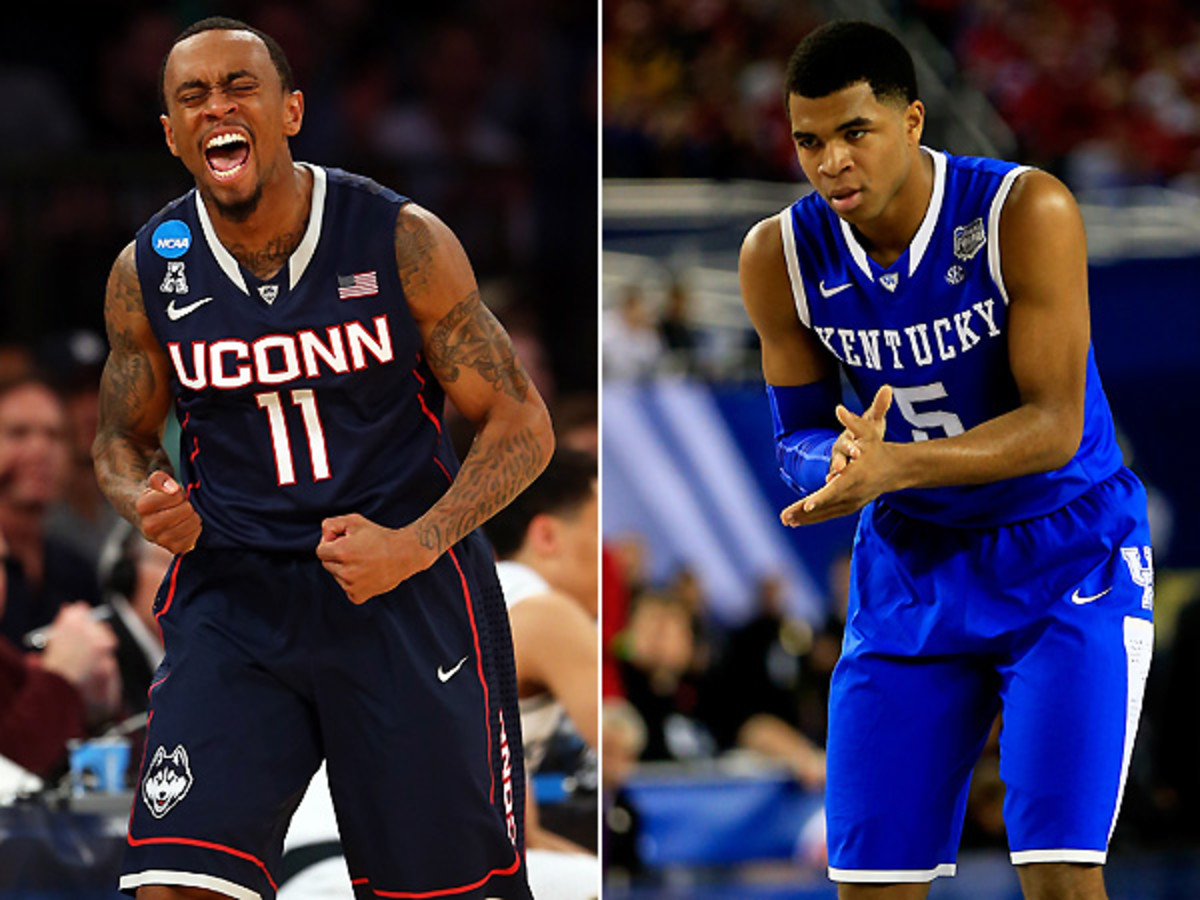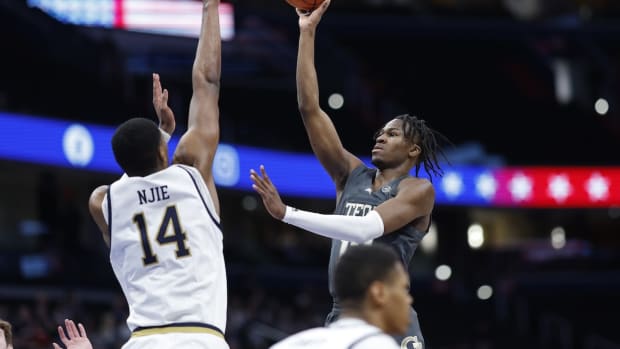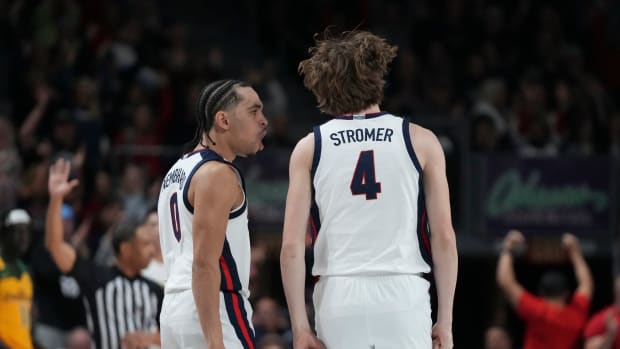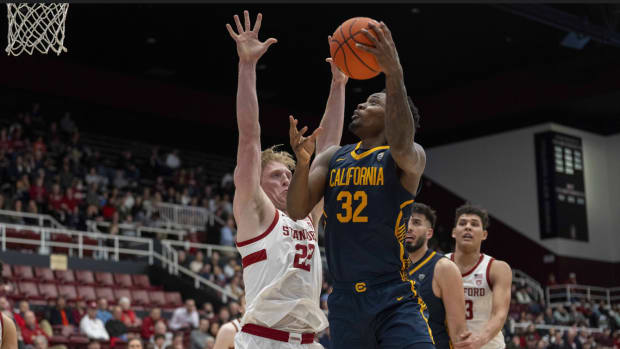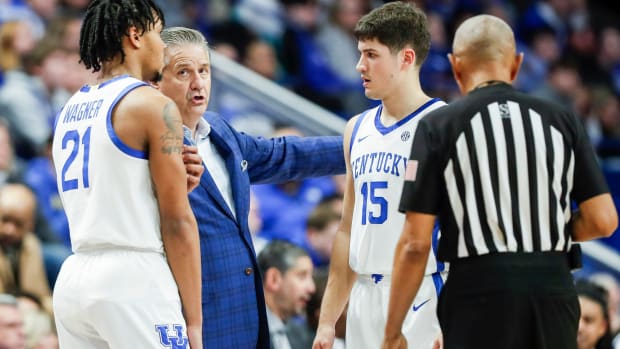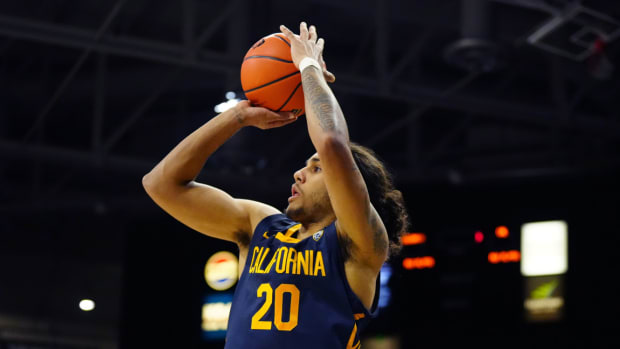Kentucky-UConn: A position-by-position breakdown of the national championship game
Ryan Boatright's (left) defense has been key to UConn's tournament run. Can he slow down Kentucky's primary ballhandler, Andrew Harrison? (Getty Images)
ARLINGTON, Texas – They're here, and it's probably best not to wonder anymore about how Connecticut and Kentucky managed that.
Two teams that weren't even in the NCAA tournament a year ago will play for the national title on Monday. That is fascinating in and of itself, but even more intriguing is how it may become a strength-on-strength clash. Kentucky's offensive firepower versus Connecticut's rapacious defense. The clutch Wildcats backcourt against the attacking Huskies backcourt. Two athletic power forwards that seem more NBA ready by the game.
Here's a look at how each matchup breaks down ahead of the title tilt at AT&T Stadium:
Point Guard
Kentucky's Andrew Harrison vs. Connecticut's Ryan Boatright
We'll assume that coach Kevin Ollie sics his top defender on the Wildcats' primary ballhandler. Boatright has abused Michigan State's Keith Appling and Florida's Scottie Wilbekin in back-to-back games, with that pair combining for three field goals, three assists and seven turnovers against Connecticut. Andrew Harrison provides a different challenge; at 6-foot-6, he protects the ball with a 215-pound frame and at times effectively uses an arm bar to keep defenders at bay. He had 12 turnovers in the first two NCAA tournament games but settled down to commit eight, total, in the last three. Boatright is quicker than Harrison and could fatigue him by turning hm up and down the court. But Harrison's heft and Kentucky setting screens against the 168-pound Boatright could weart the Huskies guard down as well.
Shooting Guard
Kentucky's Aaron Harrison vs. Connecticut's Shabazz Napier
It's arguably the best player in the NCAA tournament (Napier) against the player having arguable the most clutch NCAA tournament in history (Aaron Harrison). Napier is now at 21 points, 5.4 rebounds and 4.8 assists per game during the run to the championship tilt, but he had a relatively quiet 12-point effort against Florida in the national semifinals. Harrison, meanwhile, has three straight games with three straight last-minute three-pointers that proved to be game-winners, averaging 14.4 points and shooting 56 percent from three-point range during the NCAA tournament. If Napier hadn't performed at All-America levels this season, it might be considered a wash. But Harrison will have to be as attentive on defense as he has been heroic on offense, because everything for the Huskies begins and ends with Napier.
Small Forward
Kentucky's James Young vs. Connecticut's Niels Giffey
It could be the sleeper matchup of the championship game, not least because Kentucky coach John Calipari set his sights on Young as the next breakout performer for the Wildcats. “James Young has had 25-point games, which I'll make a prediction he'll have in this Monday night game,” Calipari said. The 6-6 freshman had a game-high 17 points against Wisconsin in the national semifinals and has hit for as many as 26 points in a game this season. (He reached that mark twice, actually.) Giffey, meanwhile, has been a steady senior during the NCAA tournament, averaging 7.2 points and 6.2 rebounds per game. If he heeds the threat Young presents from the perimeter or effectively makes this a break-even matchup, that could be a small victory for the Huskies.
Power Forward
Kentucky's Julius Randle vs. Connecticut's DeAndre Daniels
Let's play "Who's The 6-9 Lottery Pick?" The answer probably isn't all of the above, but Daniels' NCAA tournament run is helping his stock. The Huskies junior is averaging 17.6 points and 7.4 rebounds during this five-game run, with two 20-point, 10-rebound nights to his name along the way. Randle is Randle, the human double-double machine, averaging 15.8 points and 10.6 rebounds per game during the NCAAs. It might be the first time Randle has encountered a nearly exact physical match during this run, a player capable of keeping up and challenging him at the rim. Daniels, however, can't afford to battle Randle straight into foul trouble. The title game's direction could be determined by which player can stay on the floor longer.
Center
Kentucky's Dakari Johnson vs. Connecticut's Philip Nolan
It's really Nolan and Amida Brimah with a timeshare at the position for the Huskies. Brimah, who averages 18.4 minutes per game to Nolan's 13.4, offers slightly more of a shot-changing presence with six blocks in the tournament so far. It might be a position at which Kentucky can create some space. Johnson, the 7-foot freshman, is by no means a polished weapon. But he's hit 16-of-24 shots from the floor during the NCAA tournament run and averages 7.2 points per game. He might not dominate, but he's far more of a threat than either of the players that will guard him. If Johnson can push the Huskies into foul trouble and deeper into their bench, advantage to the Wildcats.
Benches
Kentucky rolls in two players capable of contributing in big ways: Forwards Alex Poythress and Marcus Lee. Poythress is averaging 6.2 points during the NCAA tournament and is coming off an eight-point, seven-rebound performance in the national semifinal against Wisconsin. Connecticut basically offers Brimah, forward Lasan Kromah and guard Terrence Samuel, none of whom are light-it-up scoring outlets. But Samuel's presence in a three-guard lineup sparked the Huskies' comeback and takeover of the national semifinal win over Florida. He gives Kevin Ollie options to set the terms of engagement against the Wildcats, at least.
